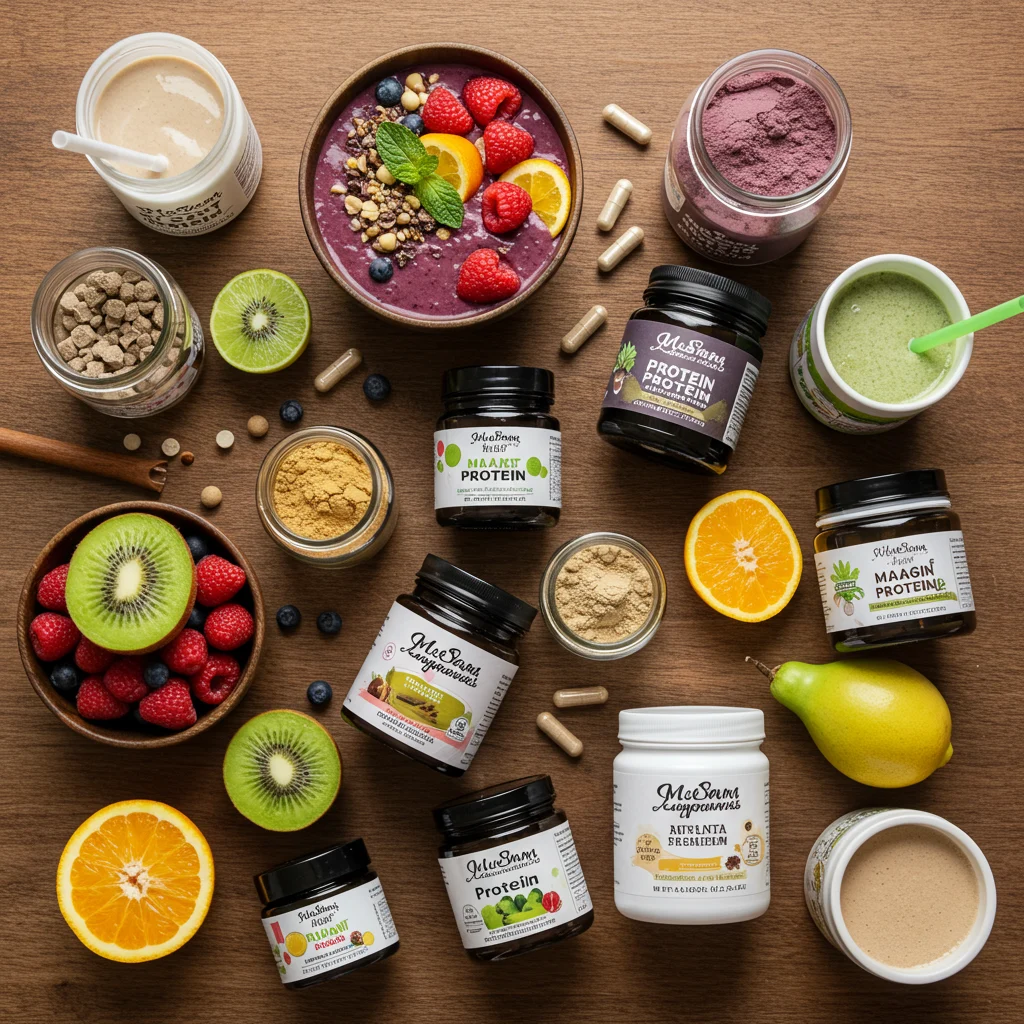Introduction to Food Supplements
In today’s fast-paced world, maintaining a balanced and nutritious diet can be challenging. Many individuals turn to food supplements to help bridge nutritional gaps and support their overall health. These products come in various forms and can offer targeted benefits, but understanding their true value requires a deeper look into their history, function, and importance in modern diets.

What Are Food Supplements?
Food supplements are concentrated sources of nutrients or other substances with nutritional or physiological effects. They are designed to complement the diet and are usually available in forms such as tablets, capsules, powders, or liquids. Unlike conventional foods, supplements provide specific nutrients in measured doses, making it easier to meet individual health needs.
Brief History of Food Supplementation
The use of natural substances to promote health dates back thousands of years. Ancient civilizations consumed herbal tonics and extracts for vitality and healing. However, the modern era of food supplementation began in the early 20th century with the discovery of essential vitamins and minerals. Advances in science have since expanded the range of available supplements, making them accessible to a global audience.
How Do Food Supplements Work?
Food supplements function by providing concentrated doses of nutrients that may be lacking in a person’s diet. These nutrients are absorbed through the digestive system and utilized by the body to support various physiological functions. Supplements can be targeted to address specific deficiencies, enhance absorption, or deliver health benefits beyond what is possible through food alone.
Why Are Food Supplements Important?
While a balanced diet remains the cornerstone of good health, not everyone can consistently obtain all necessary nutrients from food. Factors such as busy lifestyles, dietary restrictions, and declining soil quality can compromise nutrient intake. Food supplements play a valuable role in helping individuals meet their nutritional needs and maintain optimal health.
Types of Food Supplements
The world of food supplements is diverse, offering solutions for a wide array of nutritional requirements. Understanding the different types can help you make informed choices tailored to your unique needs.

Vitamins
Vitamins are organic compounds essential for normal growth and metabolism. They are categorized based on their solubility:
Fat-Soluble Vitamins
These vitamins, including A, D, E, and K, are stored in the body’s fatty tissues. They are absorbed alongside dietary fats and play critical roles in vision, bone health, antioxidant protection, and blood clotting.
Water-Soluble Vitamins
B-complex vitamins and vitamin C fall into this category. Unlike fat-soluble vitamins, they are not stored in significant amounts and must be consumed regularly. They support energy production, immune function, and collagen synthesis.
Minerals
Minerals are inorganic nutrients vital for numerous bodily processes, including nerve transmission, muscle contraction, and bone formation. They are divided into macrominerals and trace minerals based on the amounts required by the body.
Macrominerals
Calcium, magnesium, potassium, and sodium are needed in larger quantities. These minerals support bone strength, hydration, and nerve function.
Trace Minerals
Iron, zinc, selenium, and iodine are required in smaller amounts but are equally essential for immune health, metabolism, and thyroid function.
Protein Supplements
Protein supplements are commonly used to support muscle growth, recovery, and general nutrition. They are available as powders, bars, and ready-to-drink shakes, typically sourced from whey, casein, soy, or peas.
Amino Acid Supplements
Amino acids are the building blocks of protein. Some supplements provide individual or blended amino acids, such as BCAAs (branched-chain amino acids), to aid in muscle repair and performance.
Herbal Supplements
Herbal supplements use plant extracts to deliver health-promoting compounds. Popular examples include echinacea for immune support and turmeric for its anti-inflammatory properties.
Probiotics and Prebiotics
Probiotics are live beneficial bacteria that support a healthy gut microbiome, while prebiotics are fibers that nourish these bacteria. Together, they can aid digestion and enhance immune function.
Essential Fatty Acids
Omega-3 and omega-6 fatty acids are vital for cardiovascular health, brain function, and inflammation control. Supplements often source these fats from fish oil, flaxseed, or algae.
Other Popular Supplements
The market also offers coenzyme Q10, glucosamine, melatonin, and antioxidants, each intended for specific health benefits ranging from cellular energy to joint comfort and sleep quality.
Who Should Consider Food Supplements?
While food supplements can benefit many individuals, their necessity varies depending on age, lifestyle, and health status.

Are Food Supplements Necessary for Everyone?
Not everyone requires food supplements if they maintain a balanced and nutrient-rich diet. However, certain populations may be at risk of deficiencies due to dietary limitations, medical conditions, or life stages.
Special Populations Needing Supplements
Some groups are more likely to benefit from targeted supplementation due to increased nutritional demands or absorption challenges.
Pregnant and Breastfeeding Women
Pregnancy and breastfeeding increase the need for nutrients such as folic acid, iron, and calcium. Supplements can help support healthy fetal development and maternal well-being.
Elderly Individuals
Aging can reduce nutrient absorption and appetite, making it difficult to obtain adequate vitamins B12, D, and calcium. Supplements may help maintain bone density and cognitive function.
Vegetarians and Vegans
Plant-based diets may lack certain nutrients, including vitamin B12, iron, and omega-3 fatty acids. Supplements can fill these gaps, supporting energy and overall vitality.
Athletes and Active Individuals
Increased physical activity raises the demand for protein, electrolytes, and specific vitamins. Supplements can aid recovery and optimize performance, as seen in our discussion of balancing nutrition during active travel experiences.
People with Medical Conditions
Certain health conditions or medications can interfere with nutrient absorption. Supplementation may be recommended to address these unique needs under medical supervision.
How Can Food Supplements Improve Your Diet?
Integrating food supplements into your daily routine can offer practical advantages for those seeking to optimize their nutrition and lifestyle.

Filling Nutritional Gaps
Even with the best intentions, dietary gaps can occur due to limited food choices, allergies, or busy schedules. Supplements provide a convenient way to supply missing nutrients, ensuring the body functions at its best.
Enhancing Nutrient Absorption
Certain supplements, such as vitamin D with calcium or vitamin C with iron, can enhance the body’s ability to absorb and utilize nutrients more efficiently.
Supporting Dietary Restrictions
Individuals following special diets—whether for ethical, medical, or religious reasons—may find it challenging to meet all their nutritional requirements. For instance, those avoiding animal products often use B12 or iron supplements to maintain their health.
Boosting Energy Levels
Supplements like B vitamins, iron, and magnesium can support natural energy production, reducing fatigue and promoting vitality throughout the day.
How Do Food Supplements Benefit Your Health?
The health benefits of food supplements are diverse, ranging from immune support to improved cognitive function.

Supporting Immune Function
Vitamins C, D, and zinc are well-known for their role in strengthening the immune system, helping the body defend itself against common illnesses.
Improving Bone Health
Calcium and vitamin D are essential for maintaining strong bones and preventing osteoporosis, especially in older adults and postmenopausal women.
Enhancing Brain Function
Omega-3 fatty acids, B vitamins, and antioxidants have been shown to support memory, focus, and overall brain health.
Promoting Heart Health
Supplements such as omega-3 oils, magnesium, and coenzyme Q10 can contribute to healthy cholesterol levels and normal blood pressure, supporting cardiovascular wellness.
Aiding Digestion and Gut Health
Probiotics and digestive enzymes help maintain a balanced gut microbiome, improving digestion and nutrient absorption.
Supporting Healthy Skin, Hair, and Nails
Biotin, collagen, and vitamin E are popular choices for enhancing the appearance and strength of skin, hair, and nails.
Managing Weight and Metabolism
Supplements like green tea extract and conjugated linoleic acid (CLA) may help support healthy metabolism and weight management, especially when combined with a balanced diet.
Reducing Inflammation
Turmeric, curcumin, and omega-3 supplements offer natural anti-inflammatory properties, providing relief for those with joint discomfort or chronic inflammation.
As experts often say:
“Supplements should be used to fill nutritional gaps, not replace healthy food choices. A supplement can support your journey, but it’s not a shortcut to optimal health.”
Can Food Supplements Prevent Diseases?
There is growing interest in the potential of food supplements to help prevent chronic diseases. While supplements alone are not a cure, they can play a supportive role in long-term health management.

Role in Chronic Disease Prevention
Research suggests that certain nutrients contribute to the prevention of heart disease, cancer, diabetes, and cognitive decline. However, effectiveness depends on individual needs and supplement quality.
Supplements and Cardiovascular Health
Omega-3 fatty acids, magnesium, and plant sterols have demonstrated benefits for heart health, supporting healthy cholesterol and blood pressure levels.
Cancer Prevention and Food Supplements
Some antioxidants, such as selenium and vitamin E, are being studied for their role in protecting cells from oxidative damage, potentially lowering cancer risk. However, more research is needed to confirm these effects.
Diabetes Management
Chromium, magnesium, and alpha-lipoic acid may help regulate blood sugar levels and improve insulin sensitivity in individuals with diabetes.
Cognitive Decline and Neuroprotection
Supplements containing omega-3s, vitamin E, and certain plant compounds have shown promise in supporting brain health and slowing cognitive decline, particularly in aging populations.
How to Choose the Right Food Supplements
Selecting the most appropriate food supplements requires evaluating personal health goals, reading product labels, and understanding supplement standards.

Assessing Your Nutritional Needs
Start by identifying any symptoms of deficiency, dietary gaps, or specific health goals. Consulting with a healthcare professional can help tailor your supplement regimen to your unique needs.
Reading Supplement Labels
Pay close attention to ingredient lists, serving sizes, and recommended dosages. Look for products that clearly state the amount of active ingredients and avoid those with unnecessary fillers or artificial additives.
Understanding Dosages and Potency
Taking the right amount is crucial for safety and effectiveness. Avoid exceeding the recommended daily allowances unless advised by a healthcare provider, as excessive intake can have adverse effects.
Quality and Safety Standards
High-quality supplements are produced under strict standards to guarantee purity and potency.
Third-Party Testing and Certifications
Look for supplements verified by independent organizations, such as USP or NSF, which test for contaminants and ensure label accuracy.
Avoiding Contaminants and Fillers
Choose reputable brands that prioritize clean sourcing and transparent manufacturing processes. This helps minimize exposure to heavy metals, allergens, and unnecessary additives.
Are Food Supplements Safe?
When used responsibly, most food supplements are safe. However, misuse or overconsumption can lead to side effects and health risks.

Potential Side Effects
Side effects may include digestive upset, allergic reactions, or interactions with other nutrients. Monitoring your response is essential, especially when starting a new supplement.
Risks of Overconsumption
Excessive intake of certain vitamins and minerals, such as vitamin A or iron, can be toxic. Always adhere to recommended dosages and consult with a healthcare provider if unsure.
Interactions with Medications
Some supplements can interact with prescription drugs, altering their effectiveness or causing unwanted reactions. Disclose all supplements to your healthcare provider to avoid potential complications.
Who Should Avoid Certain Supplements?
Children, pregnant women, and individuals with specific medical conditions should exercise caution and seek professional advice before starting any new supplement.
How to Incorporate Food Supplements Into Your Routine
Building a consistent supplement routine increases the likelihood of achieving desired health outcomes. Small adjustments can make supplementation a seamless part of daily life.

Best Time to Take Supplements
The timing of supplement intake can influence absorption and effectiveness. Fat-soluble vitamins are best taken with meals containing healthy fats, while water-soluble vitamins may be consumed with water at any time of day.
Combining Supplements with Food
Pairing supplements with compatible foods can enhance nutrient uptake and reduce gastrointestinal discomfort. For example, taking iron with vitamin C-rich foods can improve absorption.
Tracking Your Progress and Results
Maintain a journal or use a mobile app to monitor how your body responds to supplements. Track changes in energy, mood, or health markers to assess effectiveness and make informed adjustments.
Common Myths About Food Supplements
Misinformation about food supplements can lead to unrealistic expectations or unsafe practices. Let’s clarify some prevalent misconceptions.

Do Supplements Replace a Healthy Diet?
No supplement can substitute for a balanced, whole-food diet. Supplements are intended to complement—not replace—nutritious meals. For inspiration on incorporating diverse foods, see our insights on enjoying a varied cuisine.
Are All Supplements Created Equal?
The quality of supplements varies widely among brands and manufacturers. Always select products from reputable sources that prioritize safety and transparency.
Is More Always Better?
Taking large quantities of supplements does not guarantee better results. In fact, excessive intake can be harmful. Moderation and proper guidance are essential for safe and effective use.
Regulation and Oversight of Food Supplements
Understanding how food supplements are regulated can help consumers make safer choices and avoid misleading products.

How Are Food Supplements Regulated?
In many countries, supplements are regulated as food products rather than medicines. This means they are subject to different standards for safety, efficacy, and labeling. Regulatory agencies monitor claims and ingredients, but oversight may be less stringent than for pharmaceuticals.
Differences Across Countries
Regulatory frameworks for supplements vary internationally. For example, the European Union enforces strict labeling and safety requirements, while the United States relies on post-market surveillance. Consumers should familiarize themselves with local regulations when purchasing supplements abroad.
Recent Trends in Food Supplements
The supplement industry continually evolves, introducing new ingredients and approaches to meet changing consumer demands.

Popular Ingredients in 2024
This year, ingredients like ashwagandha, collagen peptides, and adaptogenic mushrooms are gaining popularity for their potential stress-relief and anti-aging benefits.
Personalized Nutrition and Supplements
Advances in genetic testing and data analysis now allow for personalized supplement recommendations based on an individual’s unique biology, lifestyle, and health goals.
Sustainability in Supplement Production
Consumers increasingly seek supplements produced using ethical sourcing, eco-friendly packaging, and minimal environmental impact. Brands that prioritize sustainability are leading the way in responsible nutrition.
Expert Tips for Maximizing Supplement Benefits
To get the most from your food supplements, it’s important to follow expert guidance and maintain a holistic approach to well-being.

Consulting Healthcare Professionals
Before starting any new supplement, consult with a healthcare provider to ensure safety and compatibility with your health history and current medications.
Keeping a Balanced Diet
Continue to prioritize whole foods, such as fruits, vegetables, lean proteins, and whole grains. For those interested in culinary adventures, our guide to hands-on cooking classes can help expand your repertoire of healthy recipes.
Monitoring for Adverse Effects
Stay alert for any side effects or changes in well-being when introducing new supplements. Adjust your regimen as needed and seek professional advice if concerns arise.
Case Studies: Real-Life Benefits of Food Supplements
Examining real-world experiences and research findings can provide insight into the tangible benefits of food supplements.

Success Stories from Users
Many individuals report improvements in energy, mood, and overall vitality after addressing specific nutrient deficiencies. For example, travelers who supplement with probiotics often note better digestive comfort when sampling new cuisines, a point echoed in our article on navigating local food markets.
Clinical Research Highlights
Scientific studies have shown benefits of certain supplements, such as reduced risk of neural tube defects with folic acid, improved bone density with vitamin D and calcium, and enhanced cognitive performance with omega-3s. These findings underscore the potential of supplements to support targeted health outcomes.
FAQs About Food Supplements
To address common concerns, we answer some of the most frequently asked questions about food supplements.

Can I Take Multiple Supplements Together?
Many supplements can be safely combined, but interactions may occur. Consult a healthcare professional for personalized advice, especially if taking prescription medications.
How Long Until I See Results?
Results vary depending on the nutrient and individual factors, but most people notice improvements within a few weeks to a few months of consistent use.
Are Natural Supplements Better Than Synthetic?
Both natural and synthetic supplements can be effective, provided they meet safety and quality standards. The most important factor is choosing reputable brands with transparent ingredient sourcing.
How to Book on Viator
For those who love to combine health, travel, and culinary exploration, planning your trip with Viator can elevate your experience. Viator offers a wide selection of tours, activities, and hands-on food experiences worldwide. To find tours that align with your wellness and nutrition goals, simply visit their website and browse by destination or activity.

Whether you are looking to book activities that focus on local cuisine, wellness retreats, or cooking classes, Viator provides user reviews and flexible booking options to help you tailor your ideal journey.
Conclusion: Should You Add Food Supplements to Your Diet?
Key Takeaways
Food supplements offer valuable support for filling nutritional gaps, addressing specific health needs, and optimizing well-being. They should be used thoughtfully, in conjunction with a balanced diet and under professional guidance.

Final Thoughts and Recommendations
As we have seen, the right supplements can make a positive difference in your health journey, especially when paired with mindful eating and a passion for culinary discovery. For more inspiration on cooking and nutrition, consider reading about mastering new recipes in Florence. At Izase, we encourage you to make informed decisions that support your lifelong wellness. For more tips and resources, visit Izase.com.
Disclaimer: This information is accurate to the best of our knowledge; however, there may be changes or mistakes. Please verify exact details on the Viator booking page.


